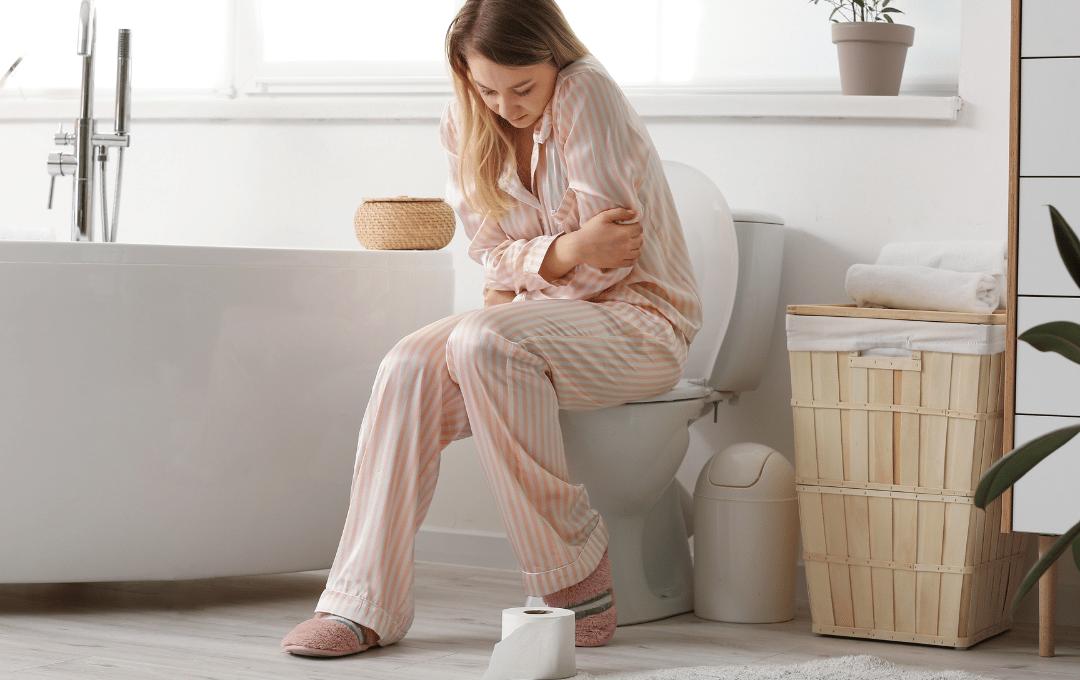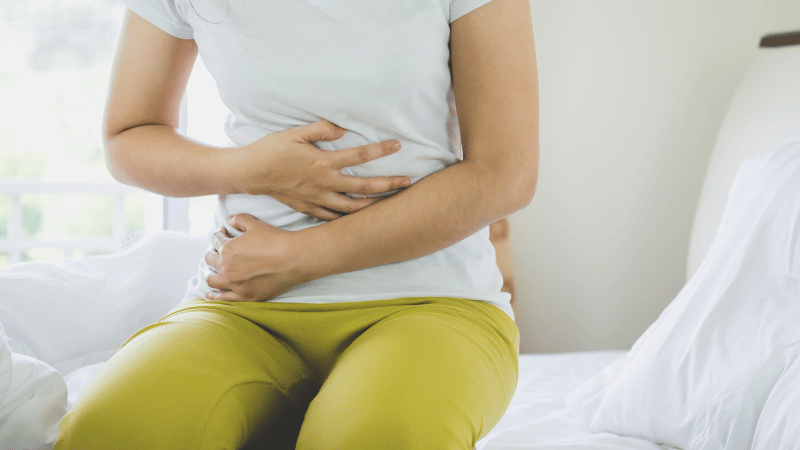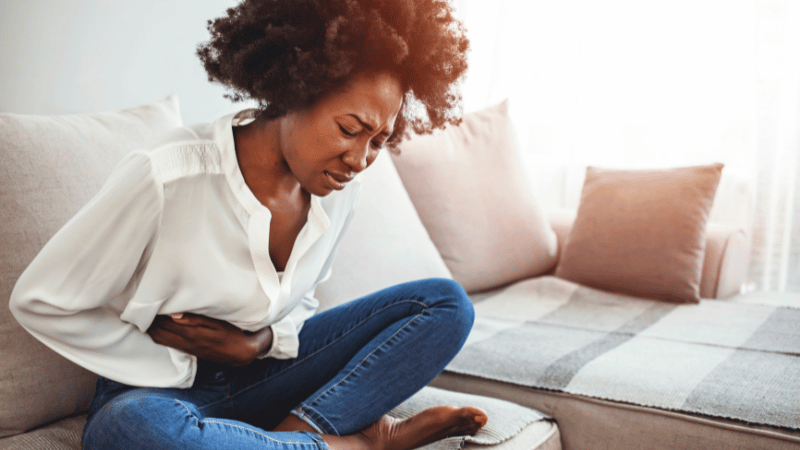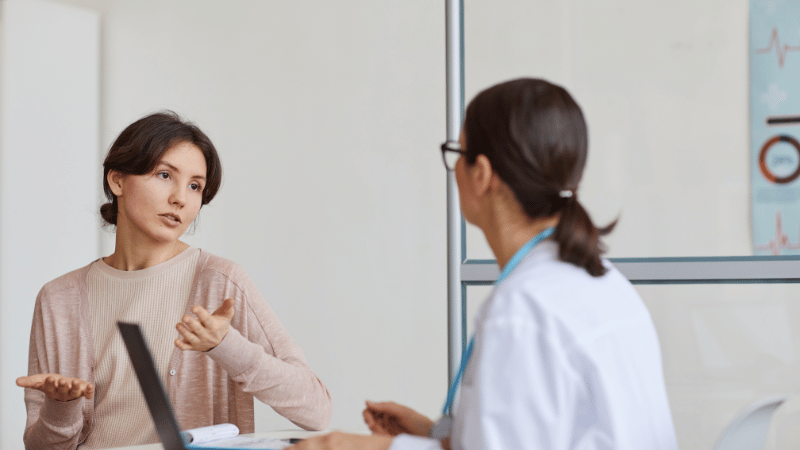
Uterine fibroids are often associated with heavy periods or pelvic pain, but their impact can extend beyond reproductive symptoms. They may grow large enough to press on nearby organs, particularly the bowels, which can result in constipation. Since this symptom mimics other digestive conditions, it is often misdiagnosed, which can further delay effective treatment.
If you’re dealing with unexplained digestive issues along with menstrual symptoms like heavy bleeding or pelvic pain, take our fibroid symptom quiz to see if fibroids could be the cause of your constipation.
Do Fibroids Cause Constipation?
Fibroids and constipation can be related as the size and location of fibroids can cause digestive issues, which may lead to changes in bowel habits, including constipation. Uterine fibroids may put pressure on the colon, intestines, and bowels, which can increase the risk of issues with bowel movements.
When you experience constipation and bloating, it can be challenging to digest your food properly. You may also experience heaviness or pain in your lower abdomen or pelvic area, along with increased abdominal discomfort, cramps, or persistent pain that doesn’t improve with over-the-counter treatments.
Additional Symptoms of Fibroid Constipation
Fibroid-related constipation can come with other symptoms that cause discomfort and affect digestion. If you’re experiencing any of the following signs in addition to fibroid symptoms, it could indicate that the fibroid tumors are affecting your bowel function:
- Infrequent bowel movements
- Stools that are hard, dry, or difficult to pass
- Straining during bowel movements
- Feeling of incomplete bowel evacuation
Why Do Fibroids Cause Constipation?
When it comes to fibroids and constipation, larger fibroids can press against the bowel, slowing down the movement of stool through the digestive tract and leading to infrequent or difficult bowel movements. This pressure may also cause a sensation of incomplete emptying, leaving you feeling bloated or full even after eating small meals.
Are Digestive Problems a Sign That Fibroids Are Getting Worse?
Digestive problems can sometimes indicate that fibroids are growing or worsening, especially if these symptoms are new or persisting without improvement over time. While occasional bloating or constipation may be related to diet or other health conditions, persistent or escalating issues may signal that fibroids are exerting increased pressure on your digestive organs.
A sudden change in your digestive health, especially when combined with other symptoms like heavy periods, pelvic pressure, or frequent urination, can be a result of fibroids. Consulting a fibroid specialist can help you determine the best treatment based on your health and individual needs.
Book Online to Find Relief Today
How To Relieve Constipation From Fibroids
If you’re struggling with fibroids and constipation, you can find temporary relief. Drinking plenty of water, increasing fiber intake, and staying physically active help support regular bowel movements. However, since the real issue lies in the pressure fibroids place on the bowel, you cannot fully resolve this discomfort through diet and exercise alone.
For long-term relief, you need to address the fibroids directly. One effective, minimally invasive option is uterine fibroid embolization (UFE). This non-surgical procedure cuts off the blood supply to the fibroids, causing them to shrink over time. As the fibroids shrink, they reduce pressure on the bowel and surrounding organs, making noticeable improvements in these uncomfortable symptoms. If fibroids and digestive problems significantly impact your quality of life, UFE may be a treatment worth considering.
Find Lasting Relief from Fibroids and Digestive Problems With UFE
Despite the discomfort of fibroids and digestive problems, many women delay seeking fibroid treatment. At USA Fibroid Centers, we offer UFE to help you experience lasting relief from fibroid symptoms. One of our fibroid specialists can identify the cause and then develop a treatment plan tailored to your needs.
Early treatment can help alleviate symptoms and improve quality of life. Schedule a consultation with USA Fibroid Centers online or call us at 855.615.2555.
Fibroids and Constipation FAQs
Do Fibroids Cause Gas?
Fibroids and bloating are common issues, as this condition can also cause gas. When the fibroid presses on the large intestine, it can prevent all the waste from being eliminated. If it remains in the intestine for an extended period, it can lead to excessive gas production.
Can Fibroids Cause Constipation That Doesn’t Go Away?
Fibroids and constipation can become a persistent issue, as these noncancerous growths in the uterus can grow to a large enough size to press on nearby organs like the colon and rectum. This growth makes it difficult for stool to pass, leading to constipation, although the severity often depends on the size and location of the fibroids. Those larger or situated toward the back of the uterus, near the rectum, are more likely to cause significant obstruction.
What Size Fibroids Usually Cause Digestive Issues?
Fibroids, typically 5 cm or larger, are more likely to cause bloating, constipation, and abdominal pain. Medium-sized fibroids (between 5 and 10 cm) can cause noticeable symptoms, including heavy menstrual periods and pelvic discomfort. Often, fibroids measuring 10 cm or larger result in more severe effects, such as frequent urination, a protruding abdomen, and significant constipation.





